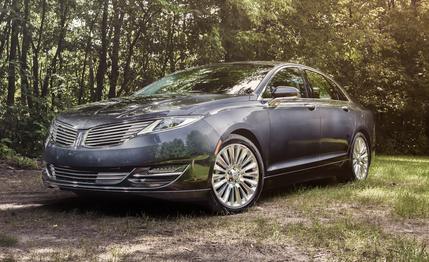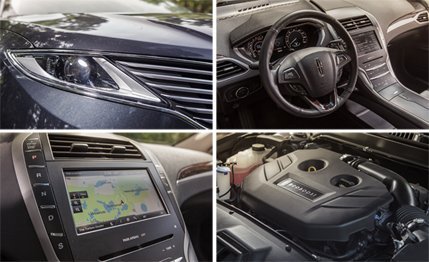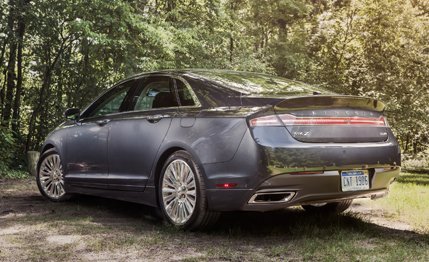 Instrumented Test
TESTED
Instrumented Test
TESTED
It’s hard not to root for Lincoln in its struggle to become a bona fide luxury brand, but it’s also hard to find compelling reasons to do so. The MKZ, poster car for the Lincoln Motor Company’s renaissance program, is a case in point. In test after test, the MKZ has come across as a fancified Ford Fusion but not upgraded enough to justify the price premium, in this case some five grand more than a Fusion 2.0T AWD in Titanium trim.
Whatever one might think about the MKZ’s styling and interior furnishings, the extra investment doesn’t pay any dividends in performance. Equipped with all-wheel drive, our test car tipped the scales at 3906 pounds, not an unusual number in this class but nevertheless a load for a 2.0-liter turbo. Generating 240 horsepower, the four-cylinder transmits power to the pavement via a six-speed automatic and works hard to haul the MKZ to 60 mph in 7.4 seconds. The quarter-mile comes up in 15.8 seconds at 88 mph, and the engine makes no secret of its toils, with a rather raucous exhaust note at full throttle.
If you want haste, you need the 300-hp, 3.7-liter V-6, which propels the MKZ to 60 mph from rest in 6.3 seconds. Of course, the 2.0-liter is pitched as balancing fuel economy against modest performance, but here the jury is out. With the EcoBoost 2.0 four-cylinder and all-wheel drive, the MKZ is projected to achieve an EPA-estimated 22 mpg city and 31 highway. The test mileage for this car was accumulated during our annual weeklong 10Best Cars evaluation, when we run cars even harder than usual, and with the throttle open more than not, the MKZ achieved 20 mpg. We’re sure real-world driving would produce better results.

Decent Dynamics
Some of the MKZ’s dynamic elements stack up pretty well. Given the firm foundations of the Fusion as a starting point, the MKZ’s unitized body comes across as a solid piece that, in turn, yields a respectable blend of ride and handling. Transient responses are prompt, if not exactly eager, body motions are well controlled, and ride quality is smooth, trending a bit toward the Euro-firm end of the spectrum.
The electrically boosted power steering could be more informative, especially on-center, but it’s quick (2.7 turns lock-to-lock) and accurate once the driver is acclimated. Similarly, even though the six-speed doesn’t respond as briskly to paddle-shift commands as does, say, a Volkswagen DSG, manual shifting is prompt enough and lends a touch of sportiness to the experience. And the six-speed is creamy in full-auto mode.
Braking performance—70 to 0 mph in 168 feet—is adequate for a mid-size car wearing all-season tires (Michelin Primacy MXM4, 245/40-19), and 0.84 g on the skidpad is maybe even a smidge better than average. Ultimately, the MKZ’s defining dynamic trait is resolute understeer, predictable given a pronounced forward weight bias combined with all-wheel drive. Then again, Lincoln never promised an autocrosser.

In any case, none of the foregoing really sets the MKZ apart. The 2014 Buick Regal, for example, delivers distinctly better performance with similar fuel economy for considerably less dough. And the MKZ’s interior, although clean and sophisticated in appearance, doesn’t really say luxury.
In the end, that’s the MKZ’s basic conundrum. Its most compelling asset is a sophisticated suit of clothes. But in autodom’s lower luxury league, good looks and mere dynamic competence aren’t enough.